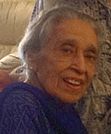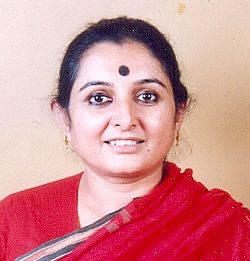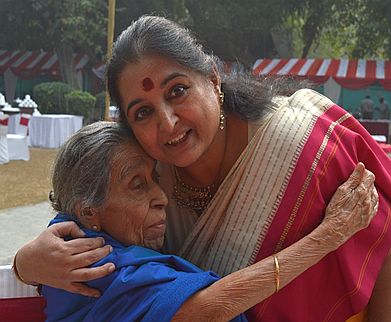Latest Contributions
Read More Contributions
My maternal grandparents and family
Category:

Indira Pasricha was born on 17 January 1917 in Sidhpur in Multan district. She studied in Kinnaird College, Lahore. She married Prem Pasricha on 28 April 1940 in Lahore. She was a social worker and played an active role in saving Sikhs during the riots in 1984 in New Delhi. She was an active member of the women’s wing of the Bharatiya Janata Party. She and her husband Prem Pasricha helped the tribals in Orissa in setting up the Ekal Vidyalaya and eye camps.

Neera Burra, a sociologist, has a Ph.D. from the Delhi School of Economics. As Assistant Resident Representative at the U.N. Development Programme, India for several years, her focus was issues related to gender, poverty and environment. She has published extensively on the issue of child labour in India, including Born to Work: Child Labour in India Oxford University Press in 1997. Her most recent book is A Memoir of pre-Partition Punjab. Ruchi Ram Sahni 1863-1948 Oxford University Press 2017. A great granddaughter of Ruchi Ram Sahni, she maintains a blog about him https://ruchiramsahni.wordpress.com/.
Editor's note: Indira Pasricha dictated this story five days before her death in May 2017 to her niece, Neera Burra. Indira was 100 years old when she passed away.

Indira Pasricha, left, with Neera Burra. Delhi. 2015
My maternal grandfather, Dewan Tek Chand,belonged to Sidhpur in Multan district. He was a very ambitious and studious person. After finishing his studies in Multan, he went to England to do law. He sat for the ICS examination and did very well. While he was away in England, his wife went with their two children to stay with his parents. The older child was a son, Khem Chand, and the younger child was Ramadevi, my mother.
When my father returned from England, he had to go to Haridwar to do the Shuddhi havan (purification ritual) before he was accepted by the extended family. He wanted to settle down in a central place where there were good schools, and the climate was also good. He bought a house in Dehra Dun at 14, New Road.
Mama's brothers went to Colonel Brown's school. But Mama was sent to Waverley convent in Mussoorie as there was no good school for girls in Dehra Dun. She was a boarder there. Beef was served in Waverley convent, but as a Hindu she could not eat beef. So her food was cooked by the dhoban (woman who washed clothes).
At Waverley she studied French and English, and learnt to play the piano. When the Kanya Mahavidyalaya (school for girls) was opened in Dehra Dun, she left Waverley and joined it.
After Mama, three more children were born to me maternal grandparents in Dehra Dun - Nanak Chand, Shastri Chand and Misri Chand. My grandfather went to Misr (Egypt) to learn Arabic, and that is why her brother was named Misri Chand.
Mama was the only daughter with four brothers and she was her father's favourite. She collected stamps, was a very good horse rider and also very good at chess.
Uncle Khem went to England to study law. When the first World War started, he was called back. He was very lucky. He left his luggage and went to buy a book to read. When he returned he found the ship had sailed away. And that ship was later torpedoed.
He came back to Lahore, and was the driving force behind the creation of Model Town. Ours was the first house built there. There were a lot of malta trees there. Sometime we used to go and spend the weekend there. All around there were jungles.
Uncle Khem had one son, Prem, who was one year older than me, and a daughter Ved Kumari, who was the same age as my brother Jagjit. She died at the age of right years. We used to go very early in the morning. Prem used to go with his shotgun as they were clearing the jungle.
Lahore was built in the centre very quickly.
After that, Uncle Khem stayed in a place called Dilshad between Delhi and Shahdara. He stayed in the commissioner's house in old Delhi. He could not stay alone so he took a place on rent in Connaught Circus below Madras Hotel. Around the corner his brother Nanak had an office. Nanak Chand was an engineer who had studied in USA.
Uncle Khem was interested in collecting old things. He had bought a folding charkha which I took from him so that I could start spinning. He suddenly passed away in a diabetic coma.
At one stage in his career, my grandfather was the Commissioner of Ambala. We used to go from there to Simla. My grandmother, called Ammaji, her son Prem and wife (my Mamiji) would also join us.
Once, Ammaji took us to a toy shop where there were so many charming toys, and we liked all of them. Ammaji told us that she would give one toy to each one of us. But we were so fascinated that we could not decide which one we would take. Then we went to Simla. While in transit we chanced to cross Gandhiji. My grandfather stopped there and had a few words with Gandhiji. (Editor's note: This was probably in the early or mid-1920s.)
When my grandfather was Commissioner of Ambala, he built the Gita Bhavan in Kurukshetra. I remembered that I went with my parents to Ambala when the foundation stone was being laid. I was about 8 or 9 years old.
In 2013, I went to Chandigarh for the release of the commemoration stamp for my paternal grandfather, Ruchi Ram Sahni. I asked my cousin Raman Anand to take me to Kurukshetra because I had been told by someone that my grandfather's portrait was hanging in the hall but it had no name against it. No one knew whose portrait it was.
In Chandigarh, I asked my cousin Kuku to show me family photographs and soon I found one in which both of my grandfathers were present. I took the photo from her and showed it to the Gita Bhavan authorities. I walked up to the place where the photograph was placed and showed them the photograph of my maternal grandfather. They all shouted "same to same". They were surprised that I remembered my visit to Ambala so many years back.
Next day the local paper reported that the mystery of the unknown photo had been solved.
_______________________________________
© Neera Burra 2017
Editor's note: I approve all comments written by people, provided the comments are related to the story. The purpose of approval is to prevent unwanted commetns, inserted by bots, which are really adverstiments for their products.
Add new comment